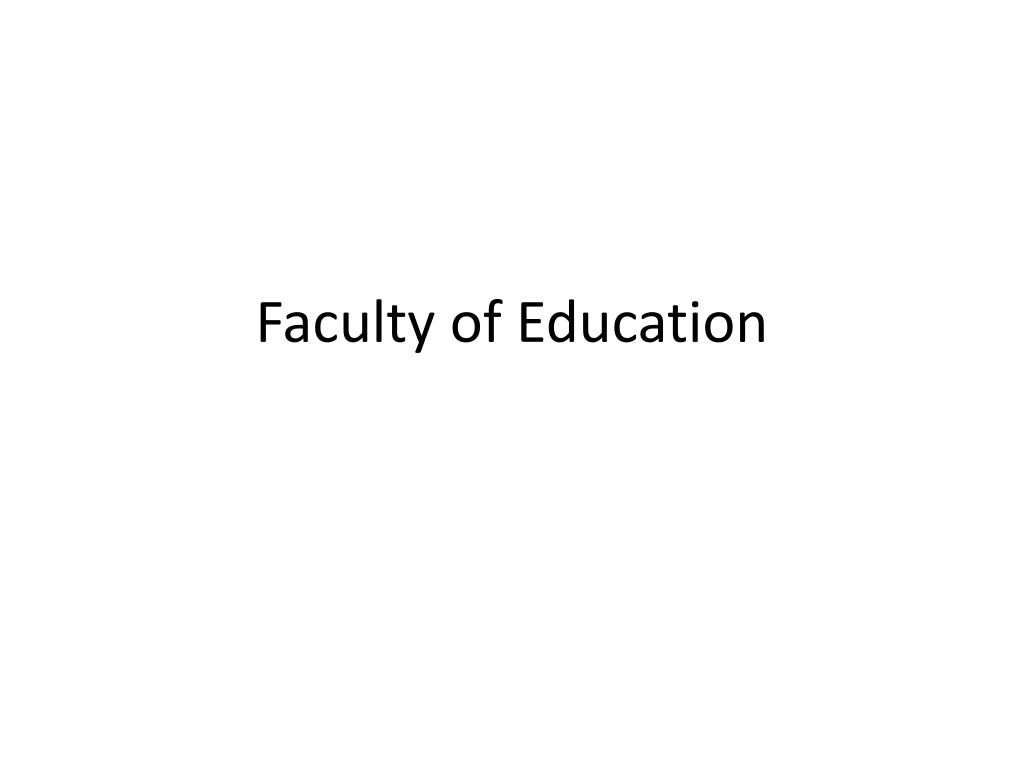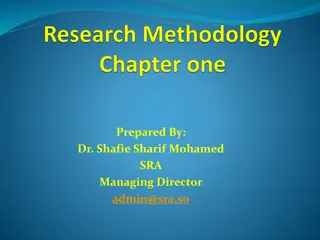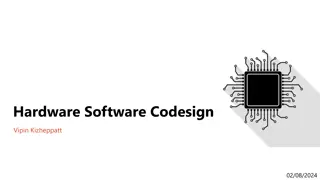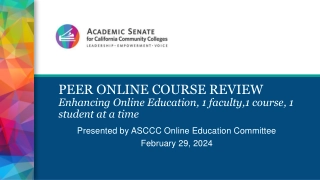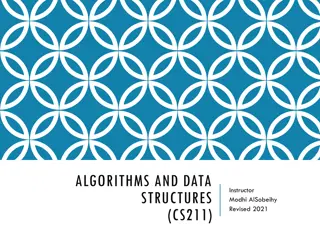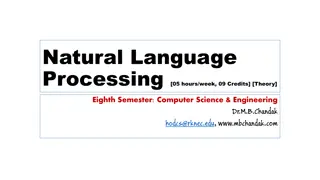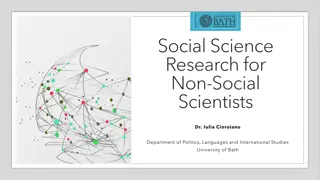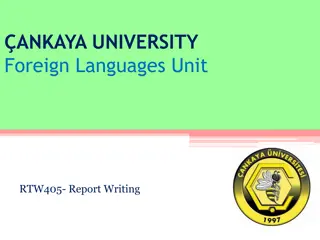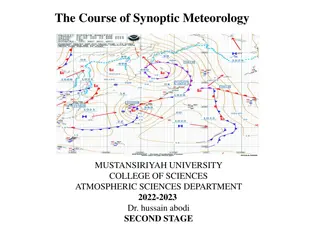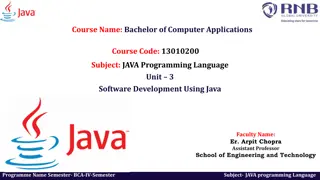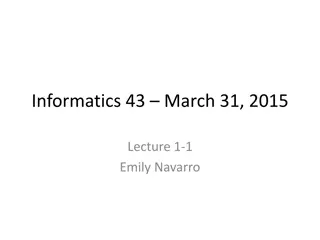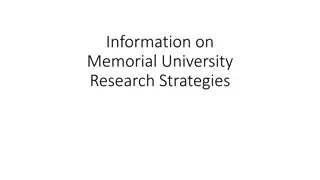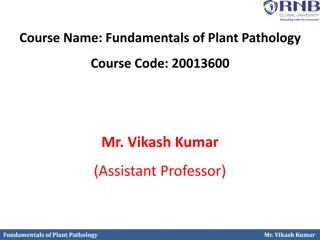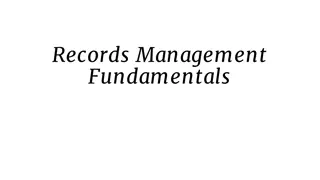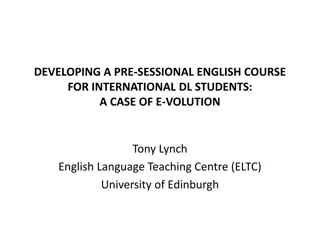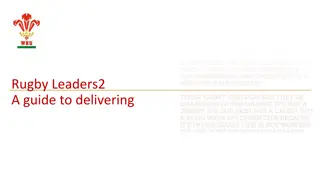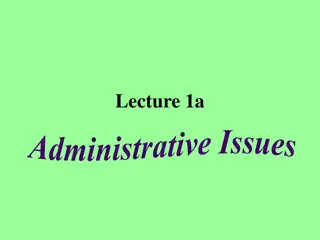Comprehensive Course on Education Fundamentals and Research at University of Kalyani
This course offered by the University of Kalyani covers a wide range of topics in education including the foundations of education, psychology of learning and teaching, curriculum development and evaluation, types of research, basic research concepts, and statistics in research. Learners will develop a deep understanding of education fundamentals and research methodologies through various learning experiences. Upon completion, participants will gain insights into the meaning, nature, bases, and agencies of education, learning, teaching, curriculum development, and research methodologies.
- Education Fundamentals
- Research Methods
- University of Kalyani
- Learning Experiences
- Curriculum Development
Download Presentation

Please find below an Image/Link to download the presentation.
The content on the website is provided AS IS for your information and personal use only. It may not be sold, licensed, or shared on other websites without obtaining consent from the author. Download presentation by click this link. If you encounter any issues during the download, it is possible that the publisher has removed the file from their server.
E N D
Presentation Transcript
University of Kalyani Department of Education (Open Course for Semester II) Second Semester EDO-01: Fundamentals of Education and Research (Open Course) Credit points/Marks-100 (80+20) Learning Experiences-80
Objectives:After completing this course the learner will be able to Explain the meaning, nature, bases, and agencies of Education Define the meaning of learning State the meaning, nature, and factors of learning Explain the meaning, stages, and levels of teaching Discuss the meaning, importance, and development of teaching skills State the foundation of curriculum development and analysis different curriculum frameworks Explain the meaning, nature and types of research Discuss some basic concept involved in research State and compute some basic statistics in research Write research proposal, research report and research paper Contents Unit-I : Foundation of Education: Meaning, Nature, Scope, functions, and agencies of Education Philosophical bases of Education Preliminary ideas about Indian schools of philosophy in relation to Education Sociological bases of Education Social groups and Education Social values, culture and Education Social stratification and Education
Unit-II :Psychology of Learning and Teaching: Learning Meaning. Nature. Factors (Motivation, Maturation, Memory, and Attention). Theories and implication (Classical Conditioning, Operant Conditioning, Gestalt, and Constructivism) Teaching Meaning. Stages. Levels. Teaching skill. Development of Teaching skills. Educational Technology Meaning, Nature, approaches, and Scope Unit-III : Curriculum Development and Evaluation: Foundation of Curriculum and Curriculum framework Evaluation of Curriculum-Formative, Summative Unit-IV : Meaning, Nature and Types of Research: Meaning and nature of research Different types of research in Social Science Basic, Applied, and Action Qualitative, Quantitative, and Mixed Historical, Descriptive, and Experimental Longitudinal and Cross-sectional Unit-V : Basic concepts in Research: Review of Related Literature- meaning and importance Hypothesis and Research question Population, Sample, and Sampling techniques- Probability(Simple Random, Stratified Random, Multistage Random) and Non-probability (Incidental, Purposive, Quota) Tools of data collection- Criteria of a good research tool. Meaning, Merits and Demerits of tools- Observation, Questionnaire, Interview, Likert scale
Unit-VI : Statistics in research Scales of measurement Central tendencies and Dispersion NPC Inferential statistics- Parametric and Nonparametric tests Reporting of research Research Proposal and Research report Basic components of writing research report Suggested Readings: Dhiman,O.P. Foundation of Education Chatterjee,S.C. &Dutta,D.M. An Introduction to Indian Philosophy Rusk,R.R. Philosophy Bases of Education Verma, V. Studies in Philosophies of Education Sinha, J. Outlines of Indian Philosophy Shrivastava, K.K. Philosophical Foundations of Education Bhattacharayya, D. Education and Philosophy. Pearson (Bengali Version) Chube, S. P.Philosophical & Sociological Foundation of Education. VinodPustakMandir, Agra, 1981. Shukla, S. .& Kumar, K. Sociological Perspective in Education, Chanakya Publication, New Delhi, 1985. Bhatt, B. D. & Sharma, S. R. Sociology of Education, Kanishka Publishers House, 1993. N. Jayaram :Sociology of Education in India, Raaat Publication, Jaipur Statistics in research and Report writing:
Sharma, S. N. :Philosophical & Sociological Foundations of Education, Kanishka Publishers, New Delhi, 1995. Sharma, K. L. :Social Stratification in India : Issues & Themes, Sage Publication, New Delhi, 1997. Talesra, H. :Sociological Foundations of Education : Kanishka Publishers, New Delhi, 2002. Sharma, Y. K. :Philosophical & Sociological Foundations of Education, Kanishka Publishers, New Delhi, 2004. Bhattachayya, D. Education and Sociology: , Pearson (Bengali Version) Aggarwal, J.C. (1995). Essentials of Educational Psychology, Vikash Publishing House Private Limited. New Delhi. Chauhan, S.S.(1996). Advanced Educational Psychology, New Delhi, Vikas Publishing Pvt. Ltd. Mangal, S.K. Advanced Educational Psychology. Prentice-Hall of India Pvt. Ltd, New Delhi(2000) Santrock, J. Educational Psychology. McGraw Hill Higher Education. 5th Ed.(2010) Woolfolk,A. Educational Psychology(Ninth Edition). Pearson Education, (2004). Bhat, B. D. and Sharma, S. R. Educational Technology Concept and Technique, Delhi :Kanishka Pub. House, 1992. Chand Tara.Educational Technology, New Delhi :Anmol Pub., 1990. JagannathMohanty. Educational Technology, New Delhi : Deep & Deep Pub. 1992 Aggarwal, J. C. Educational Technology. Sen, Malay Kr. Educational Technology. (Bengali version) Aggarwal, J.C. & Gupta, S. (2005) Curriculum Development 2005. Bhalla,Navneet.(2007) Curriculum Development. Author Press. Delhi. India.
Taba, H.(1962) Curriculum Development, theory & practice. New York, Harcourt Brace. Walker, D.F. (2003) Fundamentals of Curriculum. Lawrence Erlbaun Associates, Publishers. New Jersey. Bhattacharyya, D. Curriculum and Evaluation:, Alapana Enterprise (Bengali version) Mohsin, S. M. Research methods in behavioural science. Orient Longman. Best and Kahn Research in education. PHI Koul, L. Methodology of educational research. Vikas Publishing House Pvt. Ltd. Guilford, J. P. Fundamental statistics in psychology and education. Anastasi, A. Psychological Testing. Pearson Education. Van Dalen, D. B. Understanding Educational Research: an introduction. Neuman,W.L. Social Research Method Qualitative and quantitative approaches, Pearson Education. Ahuja,R. Research Methods, Rauat Publication, Jaipur and New Delhi. Kothari,C.R. Research Methodology method and techniques.WishwaPrakashan, New Delhi. Sukhia,S.P., Mehrotra,P.V. &Mehrotra,R.N.- Elements of Educational Research. Allied Publishers Ltd.
CHARUKALA BHAVAN UNIVERSITY OF KALYANI DEPARTMENT OF VISUAL ARTS Syllabus for Open Course (in Semester II) under the CBCS Total 4 Credits (Full marks-100) Paper I : Syllabus for Theory of Art : (Full Marks-25) --------- Credit -1
Definition of Art Definition of Line Definition of Form Meaning of Colour Wheel Definition of Perspective and its different types Use of Dimension in Art - 2D, 3D Study of Different techniques and Mediums with references of different artists and their works: Transparent Water Colour, Opaque Water Colour, Oil Colour, Tempera, Gouache, Collage Characteristic features of PAINTING Characteristic features of SCULPTURE Characteristic features of Surface in art Characteristic features of Texture in art Relation between ART and AESTHETIC Syllabus for Practical Work (to be done in the class-studio): Paper II: Composition (1 painting to be created in any medium): Full marks 25 --Credit 1 Paper III: Experimental Art work (2 art works to be created in any medium): Full marks 50 --Credits 2 (Materials e.g. canvas, paints etc. for the practical work are to be brought by the students) ------------------------------------------------------------
